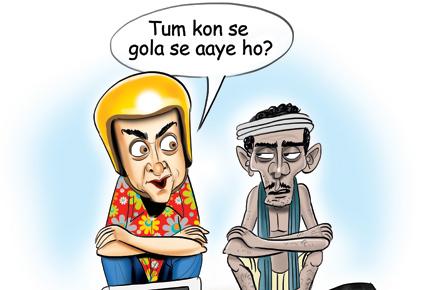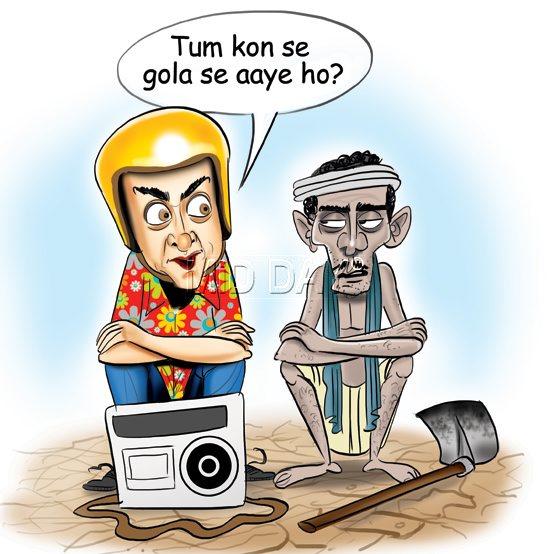The acclaimed and indefatigable journalist P Sainath recently launched a unique web based “breathing archive” called PARI — People’s Archive of Rural India

Opinion, Paromita Vohra, Mumbai, 'pk', Aamir Khan
 The acclaimed and indefatigable journalist P Sainath recently launched a unique web based “breathing archive” called PARI — People’s Archive of Rural India. A beautiful and diverse record of rural life — farming and crafts, economy and labour, forests, fields and mines, caste and famine, struggle and song, indeed the spectrum of lived life in the Indian countryside by nearly 850 million Indians.
The acclaimed and indefatigable journalist P Sainath recently launched a unique web based “breathing archive” called PARI — People’s Archive of Rural India. A beautiful and diverse record of rural life — farming and crafts, economy and labour, forests, fields and mines, caste and famine, struggle and song, indeed the spectrum of lived life in the Indian countryside by nearly 850 million Indians.
These are images and stories from an India that seem to be vanishing from the imagination of India. Just as many countries of the global south (or the Third World) mostly show up in the Western press in terms of catastrophe, disaster or ‘heinous traditional practices’, so the rural shows up in urban media, quite the same way: a foreign country of disaster and backward tradition resulting in violence.
ADVERTISEMENT

Illustration / Amit Bandre
This past week the biggest industrial strike by coal unions in 30 years found back pages reference in the papers, and mostly in tones of admonishment. The High-Level Committee on the Status of Tribals which outlined how development strategies have left tribal communities worse off than before, barely found a mention in the mainstream media. Tribal communities make up 10 per cent of the Indian population but are 40 per cent of those displaced by development projects and hardly half of these have been rehabilitated. Sedition cases have been filed against 7000 villagers protesting against the Koodankalum plant but who’d know whether they weren’t subscribed to certain kinds of news feeds?
These stories don’t feature in what provides us news of reality. And they certainly do not register even as stereotypical images anymore in our fantasies. The village dweller long represented a (highly dubious) figure of innocence. Think Raj Kapoor in Shri 420. His innocent gaze, was the classic device through which the city’s supposed degeneracy was shown to city dweller’s anew. The villager was stereotyped as some kind of pure, essential India, the childlike ingénue whose incredulous gaze made us see how absurd and cruel were the equations of inequality generated by the urban elites. There is much to critique in
this morality.
The last time we saw an analogous figure in Hindi movies was that of the amoral except where it really mattered — at heart — Munnabhai of Rajkumar Hirani’s films. A city dweller with enough roots in the hinterland to re-connect us to a simpler (and of course simplistic) view.
It’s quite ironic that this figure, has been replaced by an alien, a being from another planet in Rajkumar Hirani’s new film PK. His only rural element is a cosmetic one, in the form of the Bhojpuri he spaks. It’s certainly true that for the primarily urban audience of a film like PK, the village is indeed an alien planet.And how indeed could we identify with his gaze were PK an Indian villager. We can no longer afford to cling to that innocence, knowing all too well in our hearts the thing we find difficult to dwell on — that our lives and comforts and happy days are increasingly built by hollowing out certain other lives and eclipsing these other realities.
It would be unbelievable to have such a pastoral character in our films, because his eyes would have to contain anger and accusation, not innocence and belief. And that’s not a gaze we are at all able to meet right now.
Quite different from the villager of older films, the gaze of this being did not ask us to look at our cruelties or implicatedness in injustice. It pointed only to our safer stupidities, those which will not require a radical reimagining of our structural realities.
Paromita Vohra is an award-winning Mumbai-based filmmaker, writer and curator working with fiction and non-fiction. Reach her at www.parodevi.com.
The views expressed in this column are the individual’s and don’t represent those of the paper.
 Subscribe today by clicking the link and stay updated with the latest news!" Click here!
Subscribe today by clicking the link and stay updated with the latest news!" Click here!







